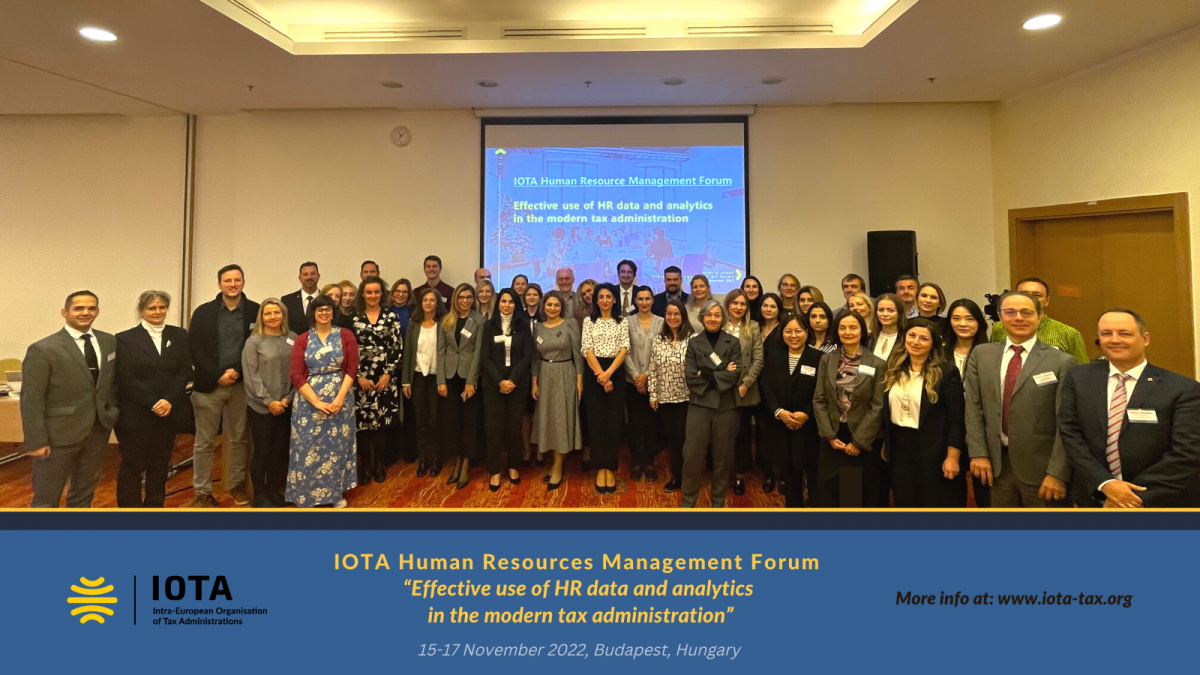On 15th-17th November 2022, IOTA had the pleasure of hosting the 4th meeting of Human Resources Management Forum in Budapest, Hungary. The event attracted a great number of HR and L&D professionals, data and analytics specialists of IOTA member tax administrations along with experts from the business community and academic society to speak about the ‘Effective use of HR data and analytics in the modern tax administration’.
After more than two years of digital operation, the HRM Forum returned to a new normal with a recently developed hybrid format by IOTA and attracted 45 participants from 25 IOTA member countries gathering personally at the venue along with over 30 attendees joining online via MS Teams to the new experience. This year’s HRM Forum was opened by Alix Perrignon de Troyes, Executive Secretary of IOTA, who welcomed the participants and highlighted the main objectives of the event.
The uncertain years of the pandemic brought a lot of changes in the operating environment of the tax administrations, which had to streamline their digital transformation processes and introduce hybrid working models along with other innovative human resource management (HRM) practices. Rapid digitalisation trends demonstrated the increasing importance of data in any organisation as a valuable resource for improved decision-making, service delivery and ongoing performance management.
On the first plenary session of the event, speakers from IOTA member tax administrations revealed case studies, best practices and focused on approaches to collecting, processing, and analysing HR data to improve decision-making, intelligently preparing the future workforce and ensure data-driven decisions in all HR-related domains. During this session the following member countries shared their experiences:
- Belgium: HR analytics into practice: recruitment, Belgian case presented by Joke Bauwens;
- Estonia: HR Analytics – the way we use it in Estonia presented by Karin Veski;
- Finland: Using HR data and analytics improving employee experience – work in progress presented by Suvi Juola & Kimmo Järvinen.
This session also opened the floor to our guest speakers coming from the business community and academic society for discussion about the value of workforce analytics, data collection to using it in a more systematic and scientific way by applying advanced HRM analytical tools and techniques with the following presentations:
- From HR analytics to evidence-based HR and back, and the way forward presented by Cedric Velghe, Center for Evidence-based Management, Belgium;
- The Value of Workforce Analytics: Why is it so important, and where do you start? presented by Rachel Phillips and Michael Purdy, Deloitte (joining online);
- To thrive in hybrid, build a culture of trust presented by Scott Adams, Director Employee Experience at Microsoft (joining online);
The second day of the HRM Forum brought more knowledge and offered another exciting mix of presentations to the participants. This session focused on the Advanced HR data analytics, predictive tools and other techniques for better decision-making where a number of country presentations reflected on the topic:
- Delivering the value of insight in HMRC through people analytics presented by Mattew Holgate, UK;
- HR initiatives and tools to support better decision making in people processes presented by Aytan Karimova, Azerbaijan;
- HR Analytics in the MoF (Austria) - Focus: Employee Turnover presented by Karl Wappel, Michael Steuer, Austria;
- HR data analytics in the Tax and Customs Academy of the Independent Authority for Public Revenue, Greece presented by Panagiotis Ballas, Greece (joining online);
- Gender mainstream - Analyse equal pay presented by Phil Abgottspon, Switzerland;
- HR Statistics – Impact on Workforce Strategy & Organisational Design presented by Gerry Dwyer, Ireland (joining online).
The closing day of the IOTA HRM Forum carried on the same theme of the previous day and gave insight into a modern workplace and talent mobilisation, showcased the use of databases in HR activity as well as discussed the topic how to integrate people analytics with organisational development. The last plenary of the event was addressed by the following presentations:
- The modern workplace and talent mobilization presented by Seamus Clancy, Head of Public Sector at LinkedIn (joining online);
- Metrics that matters. How to integrate people analytics with organizational development presented by Anna-Sara Sandvik, Sweden (joining online);
- Tax auditors' resources management presented by Ani Saribekyan, Armenia;
- Use of databases in HR activity presented by Daniela Sfetcu, Romania.
The attendees of the HRM Forum could raise questions during the Q&A at the end of each session, besides they were actively involved in group discussions and a panel debate during the three days of the event.
All material, presentations and video recordings (to be uploaded soon) from the sessions are available to registered IOTA members through the dedicated webpage of the IOTA HRM Forum on the IOTA website.

